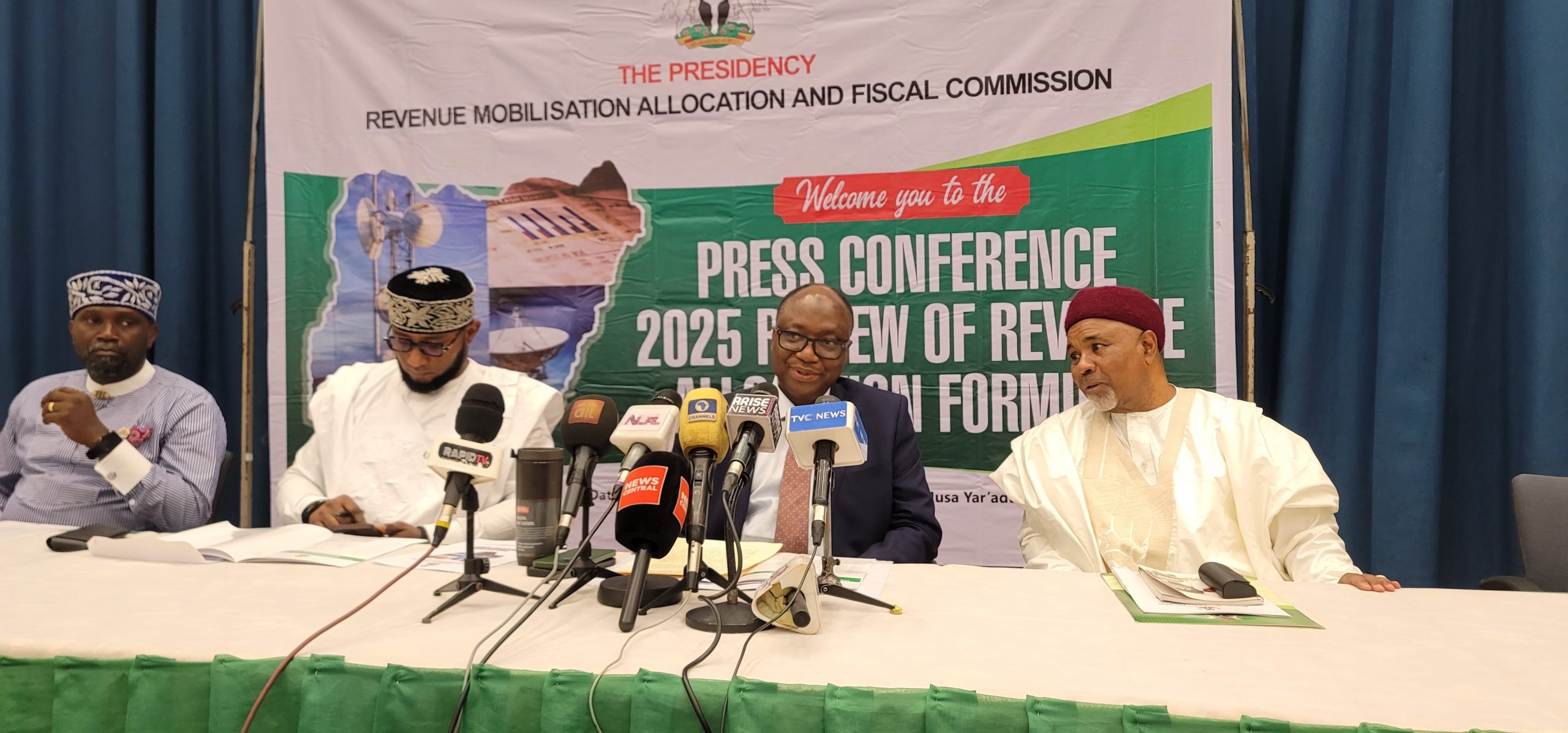Business
33 Years On, RMAFC Begins Review of All-Important Allocation Formula

By Joel Ajayi
After more than three decades, the Revenue Mobilisation Allocation and Fiscal Commission (RMAFC) has officially commenced a comprehensive review of Nigeria’s revenue allocation formula, aiming to align it with the country’s current socio-economic realities.
The last major review of the revenue allocation formula was carried out in 1992. Although there have been several executive adjustments since 2002, a full-scale overhaul had not been undertaken—until now.
Speaking at a press conference on Monday to formally launch the 2025 Revenue Allocation Formula Review, the Chairman of the Commission, Dr. Mohammed Bello Shehu, emphasized that the review is both a constitutional responsibility and a timely necessity.
He stated that the aim of the review is to establish a fair, just, and equitable revenue-sharing formula that reflects the current responsibilities, needs, and capacities of the Federal, State, and Local Governments.
“It is with a profound sense of responsibility and constitutional duty that I welcome you to this important press conference, which marks the formal launch of the review of the current Revenue Allocation Formula (RAF) for sharing revenue among the three tiers of government in Nigeria,” he said.
Dr. Shehu referenced Paragraph 32(b), Part I of the Third Schedule of the 1999 Constitution (as amended), which mandates the RMAFC to “review, from time to time, the revenue allocation formulae and principles in operation to ensure conformity with changing realities.”
He noted that the ongoing review is driven by Nigeria’s evolving economic, political, and constitutional landscape. Notably, recent amendments by the 9th National Assembly transferred several key responsibilities—such as electricity generation and distribution, railways, and correctional services—from the Exclusive to the Concurrent Legislative List.
This devolution of powers, he explained, has placed greater financial and administrative responsibilities on subnational governments, making it necessary to reevaluate the existing fiscal framework.
“The Commission will embark on a thorough, data-driven, and inclusive process,” Dr. Shehu added. “This will involve broad consultations with critical stakeholders, including the Presidency, National Assembly, State Governors, ALGON, the Judiciary, MDAs, civil society organizations, traditional rulers, the organized private sector, and development partners.”
He also noted that RMAFC will integrate cutting-edge research, empirical data, and international best practices into its analysis. The review will assess service delivery obligations, fiscal performance, developmental disparities, and economic capacities at all levels of government.
“Ultimately, our objective is to create a more balanced and sustainable fiscal federalism—one that fosters economic independence at the subnational level while ensuring equity and accountability in revenue distribution.”
Dr. Shehu also appealed for the cooperation of all stakeholders, emphasizing that the review is in the national interest and intended to benefit all Nigerians, not just select segments of the country.
In his remarks, the Federal Commissioner representing Katsina State and Chairman of the Revenue Formula Committee, Kabir Muhammad Mashi, OON, reaffirmed the Commission’s readiness to carry out a successful and impactful review.
Mashi disclosed that while the Commission had produced a report on the Vertical Revenue Allocation Formula in April 2022, it was shelved due to the 2023 constitutional amendments, which significantly altered the responsibilities of the various tiers of government as outlined in the First and Second Schedules of the Constitution.
“Hence, the need for a fresh review of the revenue allocation formula in its entirety—to reflect the current socio-economic challenges in the country, as well as the new economic policies of the current administration,” he said.
He described the event as a pivotal moment in the evolution of Nigeria’s fiscal federalism and intergovernmental fiscal relations.
“It provides an opportunity for us to brief you on our activities so far, to explain our approach, and to receive your valuable input on this vital national matter,” Mashi said. “The Commission is determined to carry out this review through a process that is inclusive, transparent, evidence-based, and fully aligned with the spirit and letters of the 1999 Constitution (as amended).”
Meanwhile, the committee is expected to submit its full report by December 2025.
Business
NEXIM Bank Secures Bbb+ Rating from Agusto & Co., Declares ₦30.47 Billion Operating Profit

By Joel Ajayi
The Nigerian Export-Import Bank (NEXIM) has been assigned a Bbb+ rating by leading credit rating agency Agusto & Co. Limited, affirming its satisfactory financial condition and strong capacity to meet obligations relative to other development finance institutions (DFIs) in Nigeria.
For the year ended 2024, NEXIM Bank reported an operating profit of ₦30.47 billion, more than double the ₦13.75 billion recorded in the previous year. This remarkable growth underscores the Bank’s financial resilience and operational efficiency.
Established to promote Nigeria’s non-oil exports and support import-substituting businesses, NEXIM is fully owned by the Federal Government of Nigeria through equal shareholding by the Central Bank of Nigeria (CBN) and the Ministry of Finance Incorporated (MOFI).
The Bank has sustained strong liquidity and capital adequacy ratios, alongside notable growth in its loan book and equity investments. Key sectors supported include manufacturing, agriculture, solid minerals, and services.
According to Managing Director, Mr. Abba Bello, NEXIM has intensified its intervention in the non-oil export sector, disbursing over ₦495 billion and facilitating the creation and sustenance of more than 36,000 direct and indirect jobs.
Among the Bank’s key initiatives are:The Regional Sealink Project: A public-private partnership designed to improve maritime logistics across West and Central Africa. Promotion of Factoring Services: Offering alternative export financing solutions for SMEs. And Joint Project Preparation Fund (JPPF): Implemented in partnership with Afreximbank to enhance the bankability of export projects.
Additionally, NEXIM is developing tailored financing schemes for the mining sector, including Contract Mining, Equipment Leasing, and Buyers’ Credit/ECA Financing, aimed at unlocking export potential and boosting foreign exchange earnings.
With its renewed drive, NEXIM Bank remains committed to building local processing capacity, advancing Nigeria’s competitiveness in global trade, and strengthening non-oil export revenues by moving up the commodity value chain.
-

 Featured6 years ago
Featured6 years agoLampard Names New Chelsea Manager
-

 Featured5 years ago
Featured5 years agoFG To Extends Lockdown In FCT, Lagos Ogun states For 7days
-

 Featured6 years ago
Featured6 years agoChildren Custody: Court Adjourns Mike Ezuruonye, Wife’s Case To April 7
-

 Featured6 years ago
Featured6 years agoNYSC Dismisses Report Of DG’s Plan To Islamize Benue Orientation Camp
-

 Featured4 years ago
Featured4 years agoTransfer Saga: How Mikel Obi Refused to compensate me After I Linked Him Worth $4m Deal In Kuwait SC – Okafor
-
Sports3 years ago
TINUBU LAMBAST DELE MOMODU
-

 News9 months ago
News9 months agoZulu to Super Eagles B team, President Tinubu is happy with you
-
Featured6 years ago
Board urges FG to establish one-stop rehabilitation centres in 6 geopolitical zones
